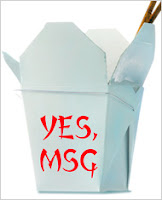Why the name "Chinese Restaurant Syndrome"? The symptom was first reported in 1968, by a physician who had eaten in a Chinese restaurant, hence created the name.
Monosodium glutamate (MSG) also known as sodium glutamate is a sodium salt from glutamic acid. It is commonly used as food additive and food enhancer. Trade names of MSG include Ajinomoto, Ac'cent, Vetsin and Tasting Powder.
Food with high MSG is mostly in fast food restaurants, from the fried chicken, salad dressing, sausages, fries to the dipping sauce. Canned food and soups, canned meat, soy sauce, Worcestershire sauce and meat flavouring cubes for soups or stew also contain MSG.
Symptoms of "Chinese Restaurant Syndrome":
- Headaches
- Dizziness
- Nausea
- Weakness
- Numbness
- Feeling Hot
- Pain in neck and chest
- Shortness of breathe
- Palpitations (fast heartbeats)
- Cold sweat
Prevention tips:
- Eat fresh food only.
- Avoid or, at least, minimise the intake of MSG in home-cooked food.
- Do not buy processed food and food containing MSG. Check the label and look out for other label names for MSG: E621, hydrolyzed protein, yeast extract, sodium caseinate, textured protein and glutamic acid and hydrolyzed vegetable protein.
- Avoid eating in places known to use MSG and food with plenty of MSG.
MSGTruth: What Food To Avoid?
In Bad Taste: The Msg Symptom Complex : How Monosodium Glutamate Is a Major Cause of Treatable and Preventable Illnesses, Such As Headaches, Asthma, Epilepsy, heart

0 comments:
Post a Comment
Share The LOVE.